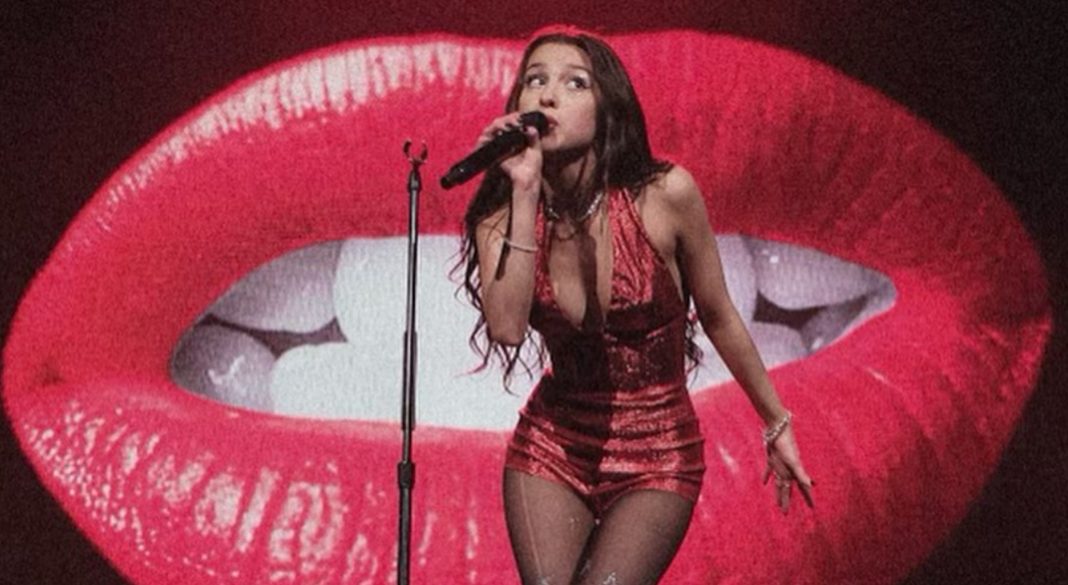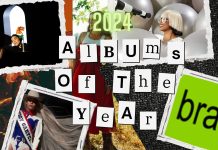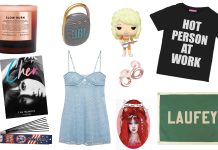When fans line up for an Olivia Rodrigo concert, many will be anticipating a life-changing experience. In giving so many young women the opportunity to scream, take up space and be their excitable, exuberant selves, Ol-Rod knows the power that comes from standing before her Gen Z audience, attempting to lead from within.
On the GUTS World Tour, she also appears to be helping her audience to navigate other forms of life-affirming decision. Following her vocal dissent in the immediate aftermath of the 2022 Roe Vs. Wade ruling in the US, Rodrigo has established the ‘Fund For Good’, which directs a share of all North American ticket proceeds to the National Network of Abortion Funds (NNAF). In every city, she has partnered with a local NGO to provide educational resources around reproductive healthcare and abortion, supplying condoms, helpline contacts and even Plan B ‘morning after’ pills (not abortion pills, as some publications have claimed). It’s ruffled some Republican feathers, but has broadly been a hit with her fans, a testament to her advocacy for female autonomy, choice and wellbeing.
News of Rodrigo’s activism has come in the same week that many artists have pulled out of Texas new-music showcase SXSW. Having discovered that the festival is in active partnership with the US Armed Forces, acts like Rachel Chinouriri, Scowl and Lambrini Girls have refused to play in solidarity with the ongoing war in Gaza, taking the opportunity to advocate for a ceasefire whilst also highlighting the personal financial costs of pulling out at such late notice.
We appear to be in a moment where vocal, political advocacy from musicians is happening more often, ranging from subtle red-carpet pin-wearing (see Billie Eilish at The Oscars) to bold, heartfelt statements and charitable fundraising. Whilst naysayers would insist that musicians should stay out of politics and focus on entertaining, others are finding that their advocacy is the very reason why they are connecting so deeply with an audience, drawn to what they stand for just as much as what they sing.
In the age of social media, there are a plethora of reasons why artists might be feeling braver about sharing their politics — not just to sleep soundly at night, but because it may actually be good for business. Grassroots movements like MeToo and Black Lives Matter have highlighted the gulf in public approval between those who speak up and those who don’t, often intersecting with cancel culture when one is perceived to have not done ‘enough’. Fans expect more from artists than ever before, and so it follows that artists will want to meet that expectation, to create closer bonds and be seen to be using their influence to listen, learn and ultimately, get more from giving back.
Dr Francesca Sobande, a senior lecturer in Digital Media Studies, has written about this very issue in her most recent book, Big Brands Are Watching You: Marketing Social Justice and Digital Culture. Taking a look at how morality manifests on social media, she explores the way in which brands (or in our case, artists), may attempt to navigate public perceptions and expectations of their social advocacy, responding to increasing pressures to stay relevant, engaged and ‘authentic’ in an increasingly competitive marketplace.
“Something that can motivate them to get involved in political commentary is a desire to reposition themselves in potentially marketable ways that tap into trending topics,” says Francesca. “Artists, bands, celebrities and brands may attempt to reframe and reestablish their public image by commenting on certain social and political issues to generate attention from audiences of people that they have not previously appealed to. In some cases, that can be part of the reinvention of the iconic image of musicians who move between different genres, and, in turn, different positions on social and political matters.”
Noticing the marketing potential of artist statements isn’t to say that they don’t also come from a genuine place, but it is emblematic of a climate where advocacy that may once have been seen as ‘risky’ is slowly becoming more acceptable, even welcomed. In music, outspoken women can earn a reputation as being ‘difficult to work with’ when they dare to critique the music industry, patriarchy or current politics. Often, artists of marginalised gender are balancing genuine fears in speaking up, they might make themselves even more vulnerable to doxxing, death threats or instances of physical harm.
Those concerns will sadly always exist, but as we respond to the inherent dehumanisation of overcrowded streaming cultures, we do also seem to be craving fully realised pop stars who feel trustworthy and grounded, able to speak openly and see the bigger picture outside of their own comfort or perceived wealth. Taylor Swift, for example, is adored for her music and work ethic but has still drawn significant criticism of late for both her private jet use and her purposefully vague posts about the forthcoming US election. Whilst many fans have defended her decision to focus on her music, others feel disappointed that she has shied away from her influential potential, shirking the opportunity to speak to issues bigger than herself. In contrast, Dua Lipa is going from strength to strength by letting audiences in on more of her personal opinion, rallying her fanbase via a book club, activism-themed newsletter and increasing political interviews. Rachel Chinouriri, meanwhile, amongst others, is part of a new guard of female pop stardom that makes ‘oversharing’ and in-the-moment tweets feel like part and parcel of the overall fan experience, ensuring that when she does have something difficult or sobering to say, people know that it is coming directly from her and her heart.
For some, it simply isn’t enough to say nothing, especially when you have previously benefited from the cultural caché of being a ‘political’ band. Last month, Bob Vylan drew headlines when gig footage circulated of them calling out IDLES and Sleaford Mods, accusing them of staying quiet on Palestine for the sake of selling records. Elsewhere, Johnny Foreigner have called out ‘spineless’ Frank Turner for continuing to play at SXSW, a direct hypocrisy of his so-called ‘punk’ credentials.
‘Fakeness’, or the perception of it, is arguably one of the biggest things that can go wrong with an artist’s socially-aware ‘brand’, as Francesca knows too well; “there’s a big difference between those artists who quickly make a one-off social media post about something and those artists who have a known history of undertaking meaningful actions and bringing continued attention to issues of injustice.” Whilst private donations and self-education don’t necessarily need to be known to social media to be worthwhile, artists who commit to a cause through tangible, public ongoing labour often stand the best chance of mobilising their fans, encouraging them to reflect on their own civic values.
“I’m thinking of those who not only speak out at their gigs or online, but who also ensure that proceeds from their music and merchandise go towards the work of social movements and community organisers,” she says. “Artists who are engaged in work and actions beyond their sector or industry, artists who refuse to play in places and venues that have a history and political position that is at odds with liberationist work, and artists who remain steadfast in their convictions, despite the industry’s relative silence on issues such as racism, sexism, misogyny, transphobia, imperialism, Islamophobia, and genocide… these are the people I like to support.”
As Francesca also notes, ‘being political’ is a responsibility that often falls upon artists who are already marginalised or counter-cultural in some way, whether it be through race, class, gender or simply being an early career band. That artists like Lambrini Girls, Bob Vylan and Rachel Chinouriri feel motivated to speak their minds is heartening, but it’s also important to see the likes of Olivia Rodrigo and Dua Lipa joining their ranks, showing that there is room for advocacy and commercial risk-taking at every level of the industry. Olivia’s advocacy in particular might feel provocative given her young audience, but it’s not about forcing abortions, sexualising teens or trying to grab rebellious headlines — it’s about recognising that in her inherent power as an artist, she can provide what so many might struggle to access by simply standing up for what she believes to be a human right. To take this commercial risk suggests that she really cares about the subject, but it also has the knock-on impact of deepening the connection she has with her audience, and maybe earning the respect of a few others too.
For those at a similar level who fear the risks of speaking up, the integrity of these artists is hopefully a comfort, proof that you can do activism in a way that wholly suits and maybe even benefits your overall ‘brand’. Within the industry, there will always be people who claim that music shouldn’t be political, and there will always be performers who would rather stick to their lane. But as leading documentarians of our culture, who else might we look to keep our creative, fighting spirit high? We might not need to berate every artist who doesn’t choose to articulate their activism, but we should certainly praise those who do, knowing that with every risk taken, they can galvanise others to understand the value of doing the same.







